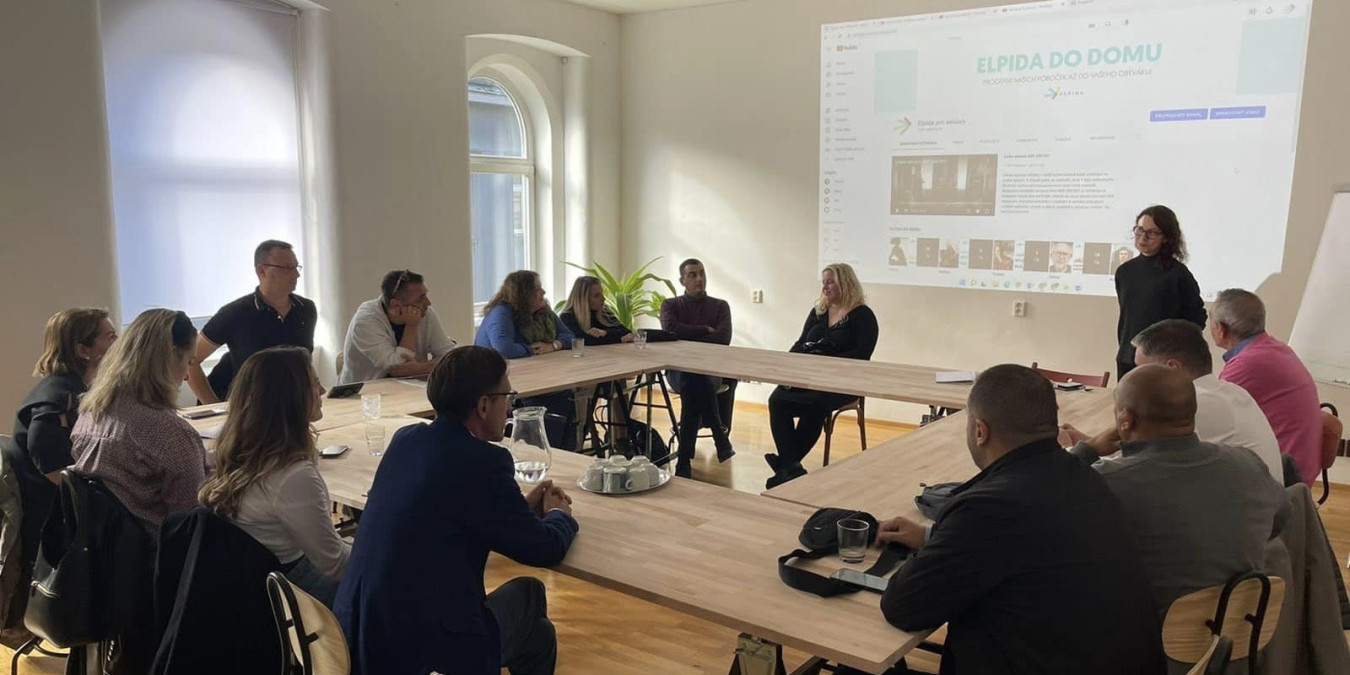To be a role model–Social services in Czechia inspire establishing a social system in Kosovo
Published: Nov 2, 2022 Reading time: 5 minutes Share: Share an articlePeople in Need (PIN) has been working in Kosovo on-and-off since 1998. During this time, we have had the opportunity to observe the emergence of local civil society. One persistent problem in Kosovo is the lack of support for vulnerable groups–minorities, elderly people, or people with disabilities. However, Czechia could be a role model for how to provide better social services.

"Social services in Kosovo are still in a development phase. We still have a lot to learn," said Tijana Grujić, project manager for NGO Aktiv based in the northern Kosovo city of Mitrovica, whom we interviewed during a study visit to Prague and Liberec. This study visit was organised within the framework of the Amplifying Local Voices for Equitable Development (ALVED) project.
In September and October, two dozen representatives of partner organisations, as well as representatives from social departments of local governments and civil society representatives from Kosovo and South Serbia, visited several institutions in Czechia–Elpida, LikeHome, Jedlička Institute and Schools, and the Regional Council in Liberec – to see how they work and what services they provide.
The political situation in Kosovo is not simple at all. How does it affect society?
The ongoing political process sometimes takes attention away from other social issues, and the long-term development of society is burdened with it. There is a complex situation in many aspects of everyday life, especially for non-majority communities and other vulnerable groups. For example, when it comes to the provision of social services, in municipalities with a Serb majority population, we have dual social security systems supported by both Kosovo and Serbia. In some places, the division is clear, and in some, it is not.
How do you work on connecting communities in Kosovo to each other when there is animosity between them?
As we are working in the social services, connecting with people and communities is more straightforward as they face similar challenges. For example, persons with disabilities deal with more or less the same issues, such as a lack of employment or centres for children with disabilities. We are creating a safe environment for interethnic dialogue where they can exchange information and knowledge. We are trying to send and share positive energy that comes back to us in a big way!
How do social services function? Is there any way of describing the development and current situation in the country?
Social services are in the development phase, and municipal centres and CSOs provide them to maintain social welfare. To ensure service quality, there is an ongoing process for licensing CSOs for certain services provided. Because a systematic and organised approach was lacking, PIN and NGO AKTIV supported drafting and adopting municipal strategies and action plans to improve social and family services at the local level in five out of thirty-eight municipalities in Kosovo. So far, these five municipalities are the only ones in Kosovo with such strategies and action plans.
What do you see as the most significant gaps within the social services in Kosovo?
A lack of capacities and a standard of quality of services; a lack of funds–CSOs depend on donor support. Such dependence has a negative impact, especially on those needing those services—as children with special needs find it hard to cope with the lack of activity that brings them joy. The situation is even more challenging for non-majority communities not well integrated into Kosovo society, as they face language barriers, a tense political situation, a lack of information, etc. New laws on social assistance and financing of local governments are still awaiting adoption.
Do Kosovo and Czechia have anything in common?
We imported the model from the Czechia—participatory social services planning where we involved local stakeholders and civil society organisations in the planning process. Strategies were adopted by municipal assemblies and thus became legally binding documents for municipalities to implement. Social services provided by the institutions at the local level are being financed from the central budget.
What did this visit give you? Is there anything, in particular, that would be worth trying in Kosovo?
Social services are much better organised, and I like the systematic approach the most. For example, as we saw in Elpida, we have many women knitting socks—especially in rural areas. Projects were supporting this activity as a way of helping them to make a small income and socialise. But, it stays there, and here we saw a complete cycle, upgraded with a good marketing plan. Restaurants employing persons with disabilities are fantastic at not only do they help people to work but they are also vital in reintegrating them into their communities. I don't have enough words to express how wonderful it was to see that, besides everything, teaching children at an early age to accept those that might be slightly different but still equally valuable members of society. So, some projects and activities may be partially or completely replicated, mentoring, guest lecturing, or study visits to share what was achieved here.
Tijana Grujić has worked as a project manager at NGO Aktiv—a partner organisation of People in Need—for more than a year. Through her work, she strives to improve the access and status of minorities and vulnerable groups in society and focuses on human rights in Kosovo.
The study visit was organised within the ALVED project, supported by the UK Government's Conflict, Stability and Security Fund (CSSF). The project is implemented by a consortium made up of the Peaceful Change initiative (PCi), PIN, two Kosovo-based civil society organisations—NGO Aktiv and Peer Educators Network—and one Serbia-based civil society organisation—Civic Initiatives. The consortium focuses on, among other things, participatory social service planning to engage civil society and municipal representatives to ensure that high-quality social services for all and grassroots civil society actors are offered capacity-building opportunities and funding for local initiatives.

